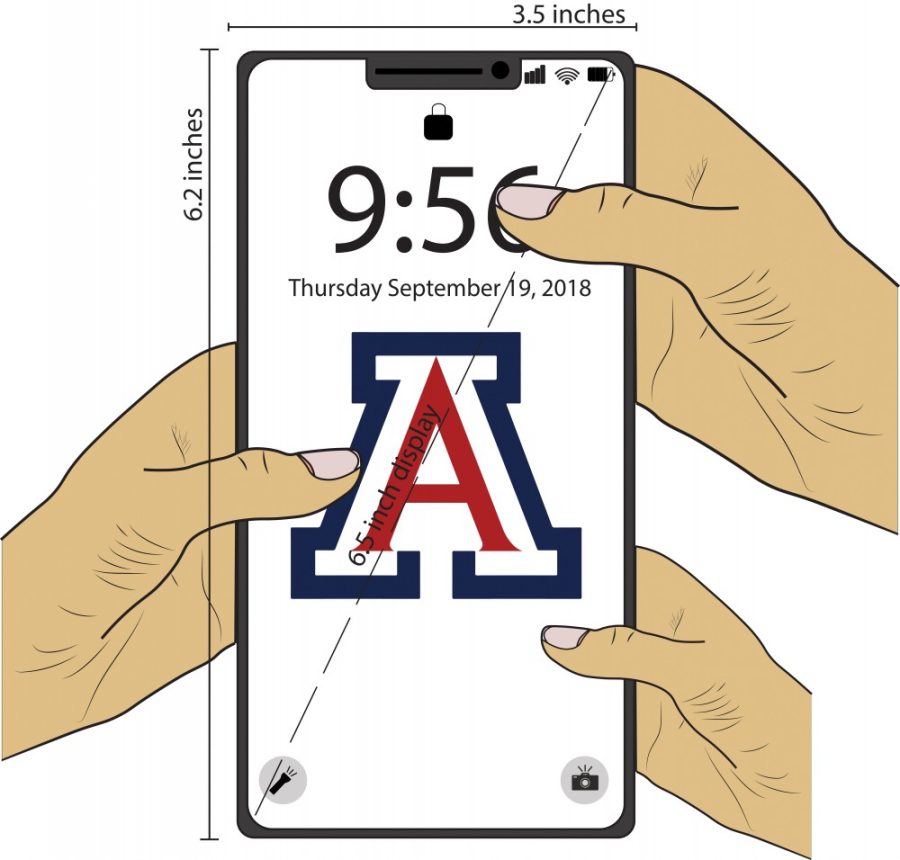Chuck Valadez:
“I’m not saying Apple is being evil and deliberately setting out to design phones that injure women by being too big for the average female hand, but that doesn’t mean it’s ok”. This was said by feminist activist Caroline Criado-Perez, a woman who has claimed an iPhone model with a 5.5-inch screen has caused repetitive strain injury. Criado-Perez is not the only woman who thinks this way, there are entire groups of women claiming Apple’s new designs are catered to men. This is in response to Apple’s new iPhone X and X Max having 5.8-inch and 6.5-inch screens respectively. Apple also announced they are discontinuing the iPhone SE with a 4-inch screen.
To me, this shows the days of “We Can Do It” posters and mentalities are long gone. Women had to fight to get where they are today in the western world, and now it seems as if they have nothing of value to fight for. Claiming a phone company is sexist because your wrist is incapable of handling a 5.5-inch device? Not only does this make you look relatively weak, it demonstrates you are unaware of the plethora of delicate men in modern times. Apple is not being sexist, not at all. Apple is discriminating to those slight of frame. Equality is far from achieved for women worldwide, but western women need to fight for causes that can be simply solved by forgoing the latest piece of technology until a smaller model inevitably comes out.
RELATED: The environmental cost of an iPhone
Sharon Essien:
Typically, when Apple announces a new product and its feature, there are always people who are disappointed or even outraged by the launch. This is the first time that I have noticed the disapproval of the new iPhones to be targeted toward its size being too “big” for women. I support the fact that the new iPhones will have bigger screens, so that I can view the content on the screen in a larger scale. I would not consider the idea of implementing larger screens on the iPhone as being sexist and favorable to the male demographic, because this type of screen allows more text to be displayed and is especially useful for viewing any type of media.
Toni Marcheva:
I feel about as targeted by large iPhones as I do by a slice of pizza that’s too big for me to finish.
However, though there’s no sexism here, I do see a problem. Increasingly, I see that consumers are stuck with phones they would not choose for themselves. For example, Apple upgrades their perfectly content customers out of their iPhone 4. Also, large phone companies like Apple make life difficult for consumers (like me) who like simple phones. After the iPhone 5 came out, many of us began receiving encrypted text messages, forcing people to upgrade into something they never wanted. And again, when Apple updates their customers out of their small phones, they will either have to choose a large device they may not want, or switch companies — which, of course, means switching operating systems. Why can’t companies just give customers what they want, or let them keep what they have? That’s the real injustice here.
Finley Dutton-Reid (Guest Columnist)
When I first saw this question, I laughed. The image of an animated iPhone X with a glowing smile and accusatory eyes chastising a woman for being slutty was just too much. However, after considering the issue in more depth, I was sobered by a frank disappointment. The fact that such a question would even appear on the New York Post exposes a serious strategic failure of the modern feminist movement.
Rather than interrogating the underlying reasons for the iPhone’s discrepancy in performance for men and women, these feminists have chosen the reactionary assumption of Apple’s culpability. Such an extreme claim chains them to an increasingly apt caricature: a rich woman complaining about how her smaller hands won’t accommodate the size of this thousand-dollar phone.
Nuanced and evidence-based critiques carry a shield from character that sweeping accusations never will. One should question the differential in the inclusion of the sexes for product studies instead. After all, wouldn’t that have a better chance of actually solving the problem than complaining on Twitter?
RELATED: Just think about it: Nike and corporate ‘wokeness’
Madeleine Viceconte:
Every year when September rolls around, the promise of the release of a new iPhone model tantalizes and excites Apple’s biggest fans. However, once this latest technology is revealed, there is indubitably something that dissatfies a portion of consumers, who waste no time before voicing their opinion on the internet. This year, the most controversial and outrageous complaint is that the new iPhone is sexist, because it is too large to fit in women’s tiny, dainty hands.
First, the women who are complaining about this are clearly extremely privileged and should be thankful that they even have a socioeconomic status that allows them to afford Apple products in the first place.
Second, they should not be making the size of a phone solely a women’s issue, when it is a problem that could potentially apply to all types of people. All they are doing is blurring the lines of the definition of feminism and discrediting work that real, intersectional feminists have been doing these past few years to bring light to the struggles of underprivileged women.
On the other hand, the malcontents might just be on to something. Women, especially women of color, are underrepresented in the tech industry. Perhaps if there were more women, who designed and engineered phones, the issue of size would have been acknowledged beforehand. Regardless, focusing on the size of one model of a phone is trivial compared to the larger issue of inadequate representation in an industry where women make up at least half of consumers.
Follow Toni Marcheva, Chuck Valadez and the Daily Wildcat on Twitter









